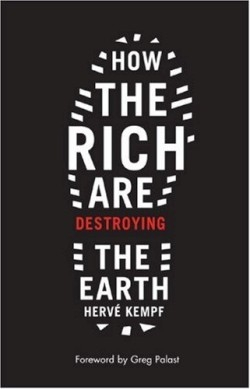How the Rich Are Destroying the Earth
Anytime fuel prices rise, people start conserving. They purchase cars with better mileage, make their homes more energy efficient, or start recycling. These gestures, writes Hervé Kempf in his book, How the Rich are Destroying the Earth, are futile. The world is in trouble, he argues, and serious measures are needed to save it.
Kempf’s argument begins with a look at various environmental crises; global warming and climate change, threatened species, ecosystem destruction, and depletion of natural resources. These problems are intrinsically tied to social issues worldwide—poverty being the most damaging. Kempf opens a chapter with a grim description of life in Relleno Sanitaro, a section of Guatemala City that literally is a garbage dump. The village consists of more than 500 people too poor to live anywhere better. Everyday, they sacrifice their health to scrape together a livelihood from items in the rubbish.
The knowledge that there are thousands of villages like this around the world makes the details of the oligarchy of the hyper-rich a nauseating litany. As Kempf chronicles their exploits—CEOs earning more than fifty times their employees salaries, tycoons competing to build the longest yacht, Paris Hilton—Kempf demonstrates how the outsized consumption of the super-wealthy is causing a crisis for everyone.
There is hope, Kempf says, but not in the measures people think. Sustainable development is pointless. The technology that supposedly will save us won’t develop in time. To stop the inertia of destruction, society, particularly the hyper-rich, need to soberly rethink their lifestyles.
Kempf, the environmental editor at Le Monde, France’s major newspaper, makes a common sense argument for anyone with a minimum knowledge of environmental issues. The book, first published in France, was an international bestseller. This English edition, skillfully translated by Thatcher, is sure to become a resource for policymakers and pundits.
Reviewed by
Katerie Prior
Disclosure: This article is not an endorsement, but a review. The publisher of this book provided free copies of the book to have their book reviewed by a professional reviewer. No fee was paid by the publisher for this review. Foreword Reviews only recommends books that we love. Foreword Magazine, Inc. is disclosing this in accordance with the Federal Trade Commission’s 16 CFR, Part 255.

